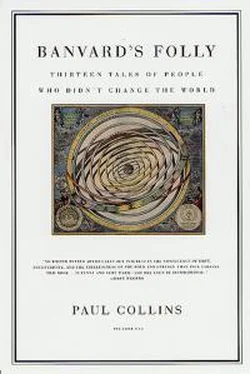At the age of eighty-five he was still tending his garden and clambering up ladders. But one fall day in 1893 he fell down from his ladder, and from then on he needed frequent care. After exhausting his friends' hospitality, Bull was finally sent to the Concord Home for the Aged, where he would live on in poverty. His lingering injuries were not just physical. In his old age, he'd hoped against hope one last time, and tried to introduce a new variety of grape commercially. But it failed badly and took all his money with it.
By 1894, an editorial writer in the agricultural magazine Meehan's Monthly was appalled by the fate of the father of the Concord grape:
[Imagine] the commonwealth without this exquisite fruit. It is safe to say
that we should be poorer to the extent of many scores of thousands of dollars annually. What Bull did for the country is certainly worthy of due reward as is the work of McCormick or Colt or Singer. He found a common species of grape such as any farmer would deem valueless and leave for his birds in hedge-rows; he spent years modifying it by the most pains-taking selection and finally gave us a delicious, cheap, and most helpful food, which will be supplying life and pleasure to millions of persons for ages after this generation has vanished.
Readers did not have to wait long to see Bull's generation vanish. One year later, the old man was dead.
The grapes lived on, of course: if you visit his Grapevine Cottage, you can still see them growing all around. But one might wonder if, after years of shying away from selling his grapes, followed by one last final flop, Bull had really given up hope. Had the sweet grape made a man bitter?
The epitaph on his headstone in Sleepy Hollow Cemetery, not far from his eternal neighbors Emerson, Thoreau, and Hawthorne, stands as an answer. It was ordered by Bull himself.
EPHRAIM WALES BULL
He Sowed, Others Reaped.
PSALMANAZAR
In 1840, rare book collectors across Europe received what at first glance was an entirely ordinary item: the catalog for an upcoming estate auction. On the block was the library of a recently deceased gentleman in Binche, France, one Count J. N. A. de Fortsas.
Count Fortsas, it turned out, was a very peculiar fellow. In his sixty-nine years he focused obsessively upon collecting an utterly unique library. He would only own books of which no other copy existed. If he discovered the existence of another copy of a book in his collection, he would burn .his book, so that he might once again experience the thrill of buying the only copy in existence. Over the years, this practice had dreadfully decimated his library, so that upon his death he owned only fifty-two books. And yet each of these books was priceless, the only copy. Collectors had long given up many of them for extinct, and still others were alluring obscurities never heard of before. Virtually every major collector in Europe found at least one item in the slim catalog that seemed to be written especially for him--and though the collector may never have heard of the title before, now he simply had to have it.
When the auction day of August 10, 1840, arrived, the streets of the little town of Binche were invaded by scores of book collectors from across the Continent, all clutching marked-up copies of the Fortsas auction catalog, and all eyeing each other in the streets with barely disguised distrust. Inquiries to the thick-headed locals were useless: none of them knew where Count Fortsas lived. Enough collectors got over their mutual distaste for each other to congregate in the local tavern, where they plied the regulars for any information on Fortsas and his precious fifty-two-volume library. As these fruitless attempts were proceeding, a man ambled in and read an official announcement: effective immediately, the proud people of Binche were to retain their great local treasure by purchasing the entire lot directly from the Count's family.
So sorry, he added, but the auction has been called off.
The tavern erupted in angry curses in French, Dutch, German, and English, all to the protestation of locals who insisted that they had never even heard of a Count Fortsas before. By the time the first collector had uttered the magic word-hoax--the man who had read the announcement was long gone.
It was decades before anyone discovered the handiwork of Renier Chalon, an antiquarian who had created the fake Fortsas catalog and gleefully salted it with nonexistent books so tantalizingly titled that he knew his greedy rivals would traverse a continent in pursuit of them. Chalon's descriptions of imaginary books were conjured up with a truly devilish personal animus, written with the precise knowledge of his rivals' obsessions so as to create the one perfect title that might drive a specific recipient in Amsterdam or London mad with acquisitiveness.
To achieve his illusion, all Chalon had to do was invent a deceased noble and some book titles. Tell people what they want to hear, Chalon had reasoned, and they will joyfully leap over their own ignorance and the most obvious improbabilities. But he was not the first to realize this. Over a century before, another had gone even further-inventing a language, a country, an entire living man.
In 1704, a time when many strange people from strange lands were strolling the streets of England's burgeoning capital, George Psalmanazar was the strangest of all. He was a Formosan, a native of the island we today call Taiwan, and the first of his kind to reach the shores of Great Britain. No one had ever seen a Formosan before; and he, presumably, had never seen an Englishman before.
Always accompanied by the Scottish chaplain Alexander Innes, who had discovered and converted the lost and wandering heathen to Christianity, Psalmanazar was famous from the moment he set foot on shore. Bishops and clergy clamored to meet this miraculous convert, a man who could speak volubly in both the cleric's tongue of Latin and in his native Formosan. Nobles and wealthy merchants of London would invite him to dinner to listen to him speak Formosan; noblewomen watched in fascination as the wild heathen paused in his discourses to dine off a dinner plate heaped with raw meat and dirty roots.
He was, he would explain between bloody mouthfuls, a victim of a kidnapping.
Jesuit priests setting up a mission on his island had singled him out for his amazing ability to learn languages and had spirited him away to a Jesuit retreat in Europe, where he was to be indoctrinated as a native missionary to Formosa --an agent of Christ who was both of their culture and yet able to perform a Latin mass. But I escaped, Psalmanazar would add. And Chaplain Innes, he recounted gratefully, had saved him when he was but a wanderer in a strange land, without a friend in the world.
His tale, of being the only man of his kind here, stranded half a world away from his home, was deeply affecting to Londoners. But there were a few problems with his tale. George Psalmanazar was not really named George Psalmanazar. He had never been kidnapped by Jesuits. He did not speak or write Formosan, or practice any Formosan religion. He had never been to Formosa; and was not, in fact, any sort of Formosan at all.
He wasn't even Asian.
We do not know where he was born. In the memoirs that he kept hidden in his desk, Psalmanazar only says that he was not born in Europe but did grow up there. He does not say which country it was that he grew up in. From hints that he left in his memoir, and from the perfect French that he was always
able to speak, some acquaintances ventured to guess that he may have been raised in southern France. But then, George was a man who could speak many languages perfectly. He could have been from almost anywhere.
Born in 1685, he grew up in a nondescript village with his mother--his estranged father, the descendant of an "ancient but decayed family," had moved far away, to Germany, when the boy was but five years old. George was an only child of sorts. There had been other siblings, but they had not survived childhood. In those days, few people did.
Читать дальше











